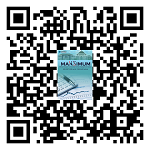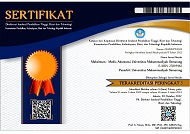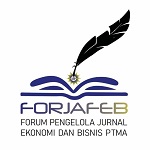Compliance Intention of Prospective Taxpayers: Self Assessment System and Understanding of Tri-Nga Tamansiswa
(1) Universitas Sarjanawiyata Tamansiswa
(2) Universitas Sarjanawiyata Tamansiswa
(3) Universitas Sarjanawiyata Tamansiswa
(*) Corresponding Author
Abstract
Taxes, as the largest source of state income, are essential for the prosperity of the people and the country's development, though they are compulsory and their benefits are not immediately felt. This study aims to examine the effect of the Self-Assessment System and understanding of Tri-Nga on the obedient intention of prospective taxpayers. The population coverage in this study is all private students in the Special Region of Yogyakarta with the number of samples taken is 99 respondents. Data was taken using the convenience sampling method and obtained by distributing questionnaires in the form of google forms. After the data is collected, the instrument will be tested to determine its validity and reliability, normality will be tested to determine whether the data is normal, whether there are symptoms of multicollinearity and heteroscedasticity, then the hypothesis will be tested with the F, T, and determination R2 tests conducted with IBM SPSS 29. The results showed that the self-assessment system and understanding of Tri-Nga have a positive significant effect on the intention to comply with prospective taxpayers. This research contributes practically to the DJP in improving tax compliance by helping to provide input that there are Tamansiswa Teachings, namely Tri-Nga, which can help to increase the obedient intention of prospective taxpayers, and contributes to academics by making this research a reference for further research
Keywords
Full Text:
PDFReferences
Ajzen, I. (1991). The Theory of Planned Behavior: Reactions and reflections. Psychology & health.
Anafiah, S., Sudigdo, A., & Masjid, A. Al. (2022). Sastra anak: media penumbuhan karakter kepemimpinan melalui ajaran Tamansiswa Ngerti, Ngrasa, Nglakoni (Tri Nga). Taman Cendekia: Jurnal Pendidikan Ke-SD-An, 6(2), 13–22. https://doi.org/10.30738/tc.v6i2.13407
Anugrah, M. S. S., & Fitriandi, P. (2022). Analisis Kepatuhan Pajak Berdasarkan Theory of Planned Behavior. Info Artha, 6(1), 1–12. https://doi.org/10.31092/jia.v6i1.1388
Aryanti, D. (2020). Pengaruh Self Assessment System Dan Pengetahuan Perpajakan Terhadap Kepatuhan Wajib Pajak. Jurnal Ilmu Dan Riset Akuntansi, 9(7), 1–21.
Damayanti, D. (2024). UMKM, Coretax, dan Rasio Pajak. Direktorat Jendral Pajak. https://pajak.go.id/id/artikel/umkm-coretax-dan-rasio-pajak
Erawati, T., Desinta Pawestri, R., & Studi Akuntansi, P. (2022). Pengaruh Self Assessment System Terhadap Tax Evaison. Jurnal Simki Economic, 5(2), 119–123.
Erawati, T., & Pelu, G. M. M. (2021). Pengaruh Pengetahuan Perpajakan, Self Assesment System, E-Filing Dan Sanksi Pajak Terhadap Motivasi Wajib Pajak Orang Pribadi Dalam Membayar Pajak (Studi Kasus Pada Kantor Pelayanan Pajak Pratama Yogyakarta). Jurnal Ilmiah Akuntansi FE UNIBBA, 12(3), 74–83.
Erica, D. (2021). Pengaruh Sanksi Perpajakan Terhadap Kepatuhan Wajib Pajak Orang Pribadi. Jurnal Ilmiah Manajemen Ubhara, 3(1), 129. https://doi.org/10.31599/jmu.v3i1.857
Hidayati, A. F., Titisari, K. H., & Kurniati, S. (2022). Pengaruh Pengetahuan Pajak, Self Assessment Sytem, Pelayanan Fiskus dan e-Filing terhadap Kepatuhan Wajib Pajak. Ekonomis: Journal of Economics and Business, 6(2), 526. https://doi.org/10.33087/ekonomis.v6i2.605
Mulyanto H. (2020). Pengaruh Self Assesment System, Sosialisasi Pajak,Sanksi Pajak dan Pengatahuan Perpajakan TerhadapKepatuhan Wajib Pajak Pada KPP Pratama Pekalongan. Skripsi Universitas Pancasakti Tegal.
Nadziroh, N. (2017). Implementasi ajaran keTamansiswaan Tri-Nga untuk menanamkan budi pekerti luhur dalam perkuliahan pendidikan kewarganegaraan. Taman Cendekia: Jurnal Pendidikan Ke-SD-An, 1(2), 93–101.
Prastini, S. L. Y., & Putra, L. F. (2022). The Effect of Tax Knowledge, Application of E-Billing System and Understanding of The Tri Nga Teachings. Amnesty: Jurnal Riset Perpajakan, 5(2), 137–148. https://doi.org/https://doi.org/10.26618/jrp.v5i2.9340.g5419
Putri, A., & Adi, P. H. (2022). Pengaruh Self Assessment System Terhadap Kepatuhan Pajak. In Jurnal Ilmiah Mahasiswa Akuntansi) Universitas Pendidikan Ganesha (Vol. 13).
Putri, N. A. C., & Difianti, A. (2023). Pengaruh Pengetahuan Perpajakan, Kondisi Keuangan, Dan Ajaran Tri-Nga Terhadap Kepatuhan Pembayaran Pajak Bumi Dan Bangunan (Studi Kasus Wajib Pajak Di Wilayah Kecamatan Mlati). Jurnal of Economic, Bussines and Accounting (COSTING), 7(1), 1231–1241.
Sandria, A. M., & Farina, K. (2023). Pengaruh Pengetahuan Pajak, Self Assessment System, Penerapan E-Filing, Dan Sanksi Pajak Terhadap Kepatuhan Wajib Pajak Yang Melakukan Pekerjaan Bebas. Trilogi Accounting and Business Research, 4(1), 132–150. https://doi.org/10.31326/tabr.v4i1.1642
Singarimbun, M., & Effendi, S. (1995). Metode Penelitian Survei (2nd ed.).
Sista, N. P. A. (2019). Pengaruh Kesadaran Wajib Pajak, Kualitas Pelayanan Pajak, Kewajiban Moral, Dan Sanksi Pajak Terhadap Kepatuhan Wajib Pajak Kendaraan Bermotor Di Kantor Samsat Gianyar. Jurnal Sains, Akuntansi Dan Manajemen, 1(3), 142–179.
Sukiyaningsih, T. W. (2020). Study of E-System Implementation And Self Assesment System Implementation of Taxpayer Compliance (Empirical Study on Individual Taxpayers at University of Serang Raya). In Jurnal Akuntansi, Kewirausahaan dan Bisnis (Vol. 134, Issue 2).
Wardani, D. K., & Anugrah, W. (2023). Pengaruh Tax Morale Dan Pemahaman Tri Nga Terhadap Peningkatan Kepatuhan Calon Wajib Pajak. Jurnal Sosial Ekonomi Dan Humaniora, 9(2), 221–226.
Yogi Ardiansyah, & Irawan, A. (2022). Pengaruh Pengetahuan Perpajakan, Self Assesment System, Dan Sanksi Perpajakan Terhadap Kepatuhan Wajib Pajak (Studi Kasus Pada Wajib Pajak Orang Pribadi Di Kpp Pratama Bojonagara). Indonesian Accounting Research Journal, 2(3), 265–280. https://doi.org/10.35313/iarj.v2i3.4132
Article Metrics
Abstract view : 51 timesPDF - 0 times
DOI: https://doi.org/10.26714/mki.15.2.2025.206-215
Refbacks
- There are currently no refbacks.
-----------------------------------------------------------------------------------------------------------------------------------------------------------------------------------
 | MAKSIMUM: Media Akuntansi Universitas Muhammadiyah Semarang |
![]()
Maksimum: Media Akuntansi Universitas Muhammadiyah Semarang is licensed under a Creative Commons Attribution Attribution-NonCommercial-NoDerivatives 4.0 International License.

















